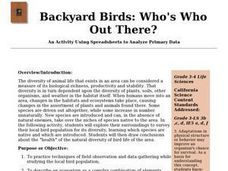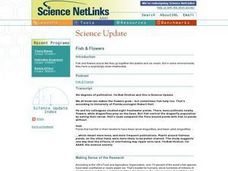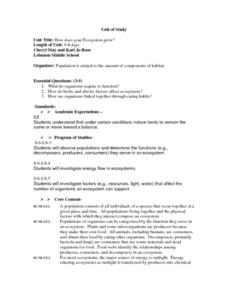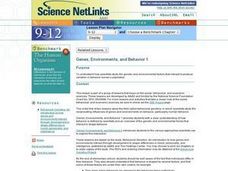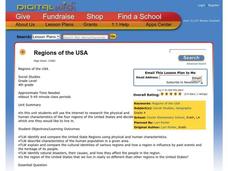Curated OER
1906 Earthquake
Students explore the impact of the 1906 earthquake on the population of San Jose. They explore two different perspectives of earthquakes. Students write a news bulletin as if they were reporting on the earthquake. They are then...
Curated OER
Sudan Surprise
Students consider animal migration patterns that have been recently documented in Sudan. They investigate the migratory patterns of animals and discuss how human conflicts and activities affect migratory wildlife populations.
Curated OER
Making Steel: An Awesome Process
Students identify the six basic stages used to create a steel component, and explain how each stage influences or interacts with another. They give examples of how technology has improved human lives.
Curated OER
Lewis and Clark
Ninth graders study the plants and animals Lewis and Clark discovered on their expedition. There is a plant illustrator, a plant recorder, an animal illustrator, and an animal recorder. They research the plants and animals and the ...
Curated OER
Changes in the New Nation
Students explore how technology has slowly changed the world, starting in the 18th Century. In this United States History lesson, students work in teams to complete numerous activities that compare and contrast life before and...
Curated OER
Topography of Africa
Students study Africa's diverse landscape and investigate how these features impact the available water supply, food sources, and population distribution of the continent. They compare topographical features and
their affect on each...
Curated OER
Backyard Birds: Who's Who Out There?
Students practice techniques of field observation and data-gathering while studying local bird population, describe ecosystem as complex combination of elements, which can affect or be affected by each other, and determine effects of...
Curated OER
Salmon Scavenger Hunt
Students go on a salmon scavenger hunt to find out about threats to salmon populations. They gather information about some of the reasons wild salmon have gone from such incredible abundance to relative scarcity, and about some of the...
Curated OER
Wilderness
Learners examine the dynamic between animals and humans in the wilderness. They work together in groups share their journal entries when asked to reflect on natural areas.
Curated OER
Fish and Flowers
Students read and discuss a research article that explains the unlikely link between increased fish populations and increased plant pollination. They answer reading guide questions to discover this ecological relationship.
Curated OER
How Does Your Ecosystem Grow?
Students consider that under certain conditions in nature tend to remain the same or move toward a balance. They observe populations and determine the functions (e.g., de-composers, producers, consumers) they serve in an ecosystem. They...
Curated OER
City Animals
Students identify some of the most important native and introduced species of animals in the United States. They describe how animals populations of cities have changed over time, outline the benefits and problems associated with...
Curated OER
Molecular Approaches to Evolution
Young scholars examine the molecular studies of organisms that have led to a new era in their understanding of speciation and evolutionary relationships. Students study the allelic frequency of genes controlling specific molecules and...
Curated OER
Genes, Environments, and Behavior 1
Learners examine how scientists study the genetic and environmental factors that interact to produce variation in behavior across a population.
Curated OER
Regions of the USA
Fourth graders research the physical characteristics of the four regions of the United States. In this geography activity, 4th graders research the four regions and use a quilt square organizer to record notes. Students complete the...
Curated OER
Remote Sensing
High schoolers study the effects of global warming on specific organisms. They research the possible problems global warming is causing.
Curated OER
Comparison of hometown life with that of life in a Canadian city
Students research cultural characteristics of a Canadian city with that of their home town. They complete a map handout, providing the relative location on a large map and the absolute location on a provincial map. Students work together...
Curated OER
Modeling Natural Disaster with Mathematical Functions
Ninth graders investigate the functional relationship of different environmental phenomena. In this math lesson, 9th graders create models of various natural disasters. They use logarithmic and exponential functions to interpret...
Curated OER
On the Road Again
Students examine migration patterns in Africa and China. They watch excerpts from a documentary, define key vocabulary words, complete various student organizers, and create a poster.
Curated OER
Understanding Demographics
Students use demographic information to gain an understanding of the Dominican Republic. They compare demographic data from the United States and the Dominican Republic and describe the difference between learning about a country from...
Curated OER
Art and Propaganda
Students examine the types of propaganda used throughout World War II. In groups, they view examples of different posters and artwork used to identify the human emotions the government was trying to appeal through. They develop their...
Curated OER
Beaver, or not?
Students study the role of the beaver in Illinois during the 1800's and how overtrapping cause the near extinction of the beaver colonies in Illinois by 1900. Students role play various people in 1945 who have an opinion about the...
Curated OER
Homeless in our Community
Third graders explore homelessness in their local community. In this service project/social studies lessons, children research local areas where homeless people reside, discuss global acceptance and unity, and visit a local food bank.
Curated OER
Micronutrient Need Intervention
Students investigate the real world applications of nutrition. They study the problem of starvation and how it affects different populations. Students work in small groups in order to devise and intervention plan. They also search out...






